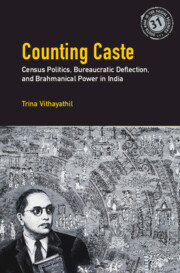
-
Select format
-
- Publisher:
- Cambridge University Press
- Publication date:
- 30 April 2025
- 05 June 2025
- ISBN:
- 9781009414135
- 9781009414111
- Dimensions:
- (228 x 152 mm)
- Weight & Pages:
- 0.6kg, 296 Pages
- Dimensions:
- Weight & Pages:
- Subjects:
- Area Studies, South Asian Government, Politics and Policy, Asian Studies, Political Sociology, Politics and International Relations, Sociology
You may already have access via personal or institutional login- Subjects:
- Area Studies, South Asian Government, Politics and Policy, Asian Studies, Political Sociology, Politics and International Relations, Sociology
Book description
States periodically agree to social justice reforms in response to organized demands for change. Counting Caste examines how and why governments make such concessions but then fail to implement them. Vithayathil unlocks the secrets of bureaucratic deflection—a process whereby political leaders and bureaucrats stall policy changes—through an in-depth examination of a caste survey in India. Political leaders conceded to collect caste-wise data in Census 2011 for the first time in India's post-independence history. Yet, in the year that followed, bureaucrats blocked a caste count in the census and rerouted it to an inexperienced part of the government. This book uncovers the plan to gather caste-wise data in an alternative project with a history of producing poor-quality data. The case of the failed caste count highlights how state institutions evade the documentation of caste power, the continued institutionalization of castelessness—which frames caste as a problem of the oppressed and hides caste privilege and power—and ongoing efforts at resisting caste hierarchy and Hindutva domination.
Contents
Metrics
Altmetric attention score
Full text views
Full text views help Loading metrics...
Loading metrics...
* Views captured on Cambridge Core between #date#. This data will be updated every 24 hours.
Usage data cannot currently be displayed.
Accessibility standard: Unknown
Why this information is here
This section outlines the accessibility features of this content - including support for screen readers, full keyboard navigation and high-contrast display options. This may not be relevant for you.
Accessibility Information
Accessibility compliance for the PDF of this book is currently unknown and may be updated in the future.


